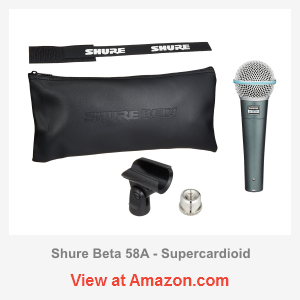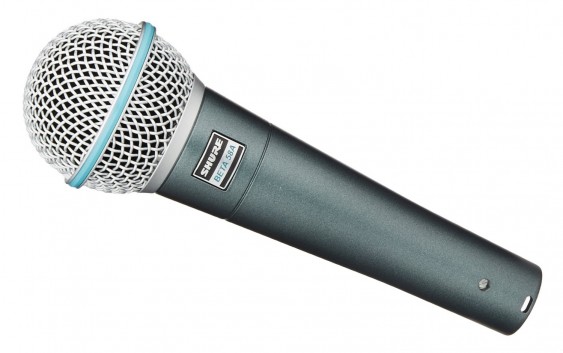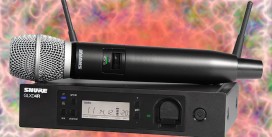Shure Beta 58A is a great performance supercardioid mic, capable of delivering nice and clean vocals without killing your budget. Fairly bright but unobtrusive in character, it clears up vocals without exaggerating on the higher register. It has a linear response throughout the entire vocal range, which is especially appreciated by versatile singers. All in all, this mic is very easy to work with, both for singer and sound engineer alike. It is also quite very durable and the feedback is not an issue! Definitely a great buy, although in terms of smoothness and subtlety, more expensive mics tend to fare a bit better.
Shure Beta 58A vs Shure SM58
For those who haven’t already compared the above mics, the difference may not be obvious, except they have different polar patterns (SM58 is a cardioid and Beta 58A is a supercardioid). Both share similar looks and model number, and neither is there a huge price difference to suggest that one is far superior to the other. Nevertheless, there is a night and day difference between the two. Not only Beta 58A has a tighter pick up pattern that makes it way more resistant to feedback, it actually blows the SM58 out of the water in terms of the overall sound!
Shure Beta 58A did somewhat retain the feel and character of the old SM58, but it is no longer muddy and honky – It’s been really improved! Moreover, it certainly sounds less harsh and more open… maybe not as great as Sennheiser e945, but still tremendously better than its predecessor. For the sake of comparison, let’s also mention a couple of other mics. If you are after a more defined sound, it is worth considering the Beta 87A condenser as well, but all three are actually great mics. If you are a cheap ass, then go check out AKG D5 but you’ll find it more blurrish and worse in terms of feedback.
Sound & quality
First of all, let’s have a close look at the frequency response of Beta 58A. Comparing to the SM58, you can see that there is less low end overall and it rolls off more naturally too. This is why the mic no longer suffers from the excessive mud and unnatural low end, for which SM58 is infamous. The boost that is responsible for the brightness, seen in 3 to 4 kHz range reveals a very smooth transition. On the other hand, SM58 has this transition in 2 to 3 kHz range and it starts a bit too abruptly. This is the point where it gets to sound honky, whereas Beta 58A remains “cool” and natural.
 In the high frequency range, Beta 58A does not have as many bumps as SM58 and so it sounds smoother and less sibilant. If you notice, the frequency response extends well above 10 kHz, and it’s awesome too. There is however a 90 degree joint at 6.3 kHz, suggesting a resonant point but it’s not that bad if you listen to it. At this frequency range, our ability to discern sounds starts to diminish rapidly, so it may as well go unnoticed. Nevertheless, some degree of harshness is there, but that is why they produce more expensive mics. At this price range, without doubts, Shure Beta 58A is an excellent performer.
In the high frequency range, Beta 58A does not have as many bumps as SM58 and so it sounds smoother and less sibilant. If you notice, the frequency response extends well above 10 kHz, and it’s awesome too. There is however a 90 degree joint at 6.3 kHz, suggesting a resonant point but it’s not that bad if you listen to it. At this frequency range, our ability to discern sounds starts to diminish rapidly, so it may as well go unnoticed. Nevertheless, some degree of harshness is there, but that is why they produce more expensive mics. At this price range, without doubts, Shure Beta 58A is an excellent performer.
The transient response has been improved too compared to the SM58, and as a result Beta 58A is better at reproducing all the details and subtleties. Nevertheless, in terms of clarity it lacks behind compared to the Sennheiser e945. Comparing to Shure Beta 87A, the difference is even more dramatic. As a condenser, Beta 87A is much more sensitive and literally hears almost everything. When performing on cluttered stages this can also turn into a disadvantage, especially in proximity to cymbals, so despite being an overall better mic, in some situations you may actually prefer Beta 58A.
There is yet another improvement compared to the SM58. Shure Beta 58A has a better voltage gain and requires less amplification. This translates to better SNR and less impact from EMI interference. The gain before feedback of this mic is excellent, and it even beats the expensive units! There are three reasons to it. First, of course is the capsule that has been made less resonant. Second is the improved insulation from the body that helps to eliminate low frequency feedbacks due to physical vibrations. Third, it is designed for close proximity and simply put it will be less sensitive to other inputs i.e. PA system.
Conclusion
I don’t think we need to talk about the build quality here because Shure is quite renowned for making durable things, and in terms of durability, it’s unlikely to be much different from our previously reviewed SM58, aka nail hammer. Therefore, I will jump straight to conclusion. So, is it worth buying Beta 58A? The answer is yes! Excellent GBF, reliability and versatility, and great overall sound – and behold, it actually turns out to be the best supercardioid mic in the sub $200 category. Besides, even if you own some more refined mics, this will serve as an excellent back up.
Pros
|
Cons
|










Beta 58 is a monster mic! I’ve been using it for 3 years now and always great results. SM58 is not nearly as good… it’s been collecting dust since I upgraded to beta!
One thing to note regarding build quality: the beta 58 has a steel screen vs. the SM58’s aluminum one, so it’s actually even more durable than the venerable SM58. Source: a Shure rep I spoke with at Sweetwater GearFest this past weekend
The Shure Beta 58 has been a great upgrade for live vocal performances. I get a clearer sound, less feedback in smaller rooms, and better response. Perfect for an independent folk rock band. redsammy.com
Just bought three Shure Beta58A microphones, which come with a hard plastic clip that doesn’t actually fit the microphone body!